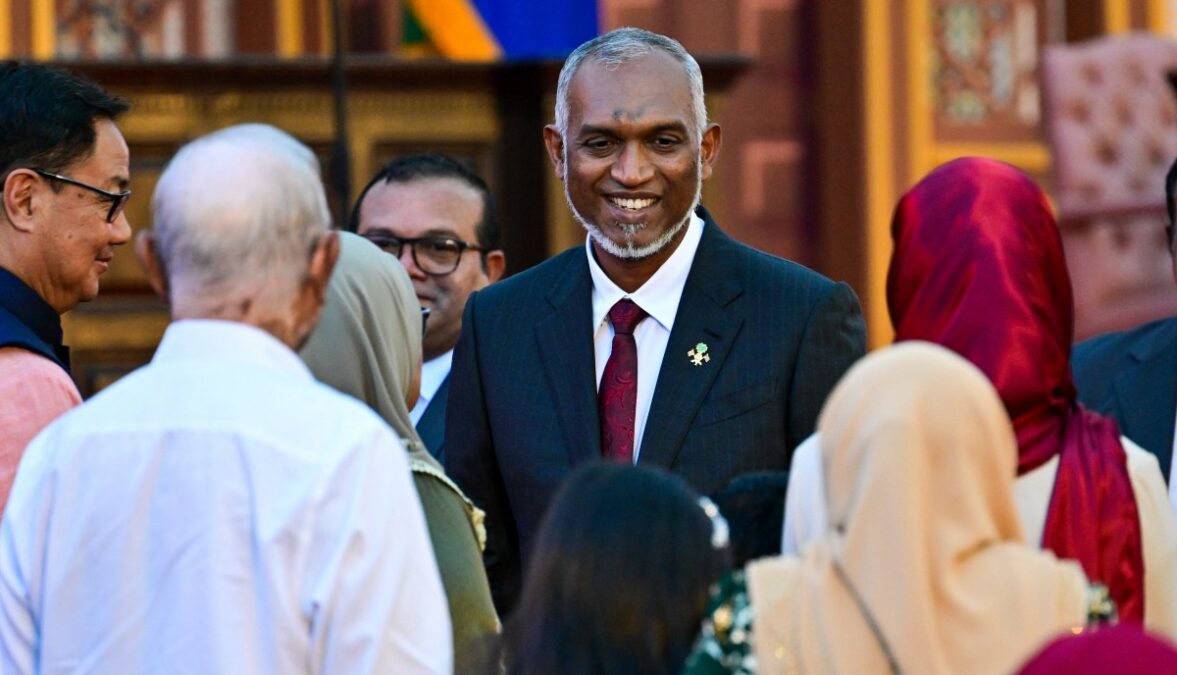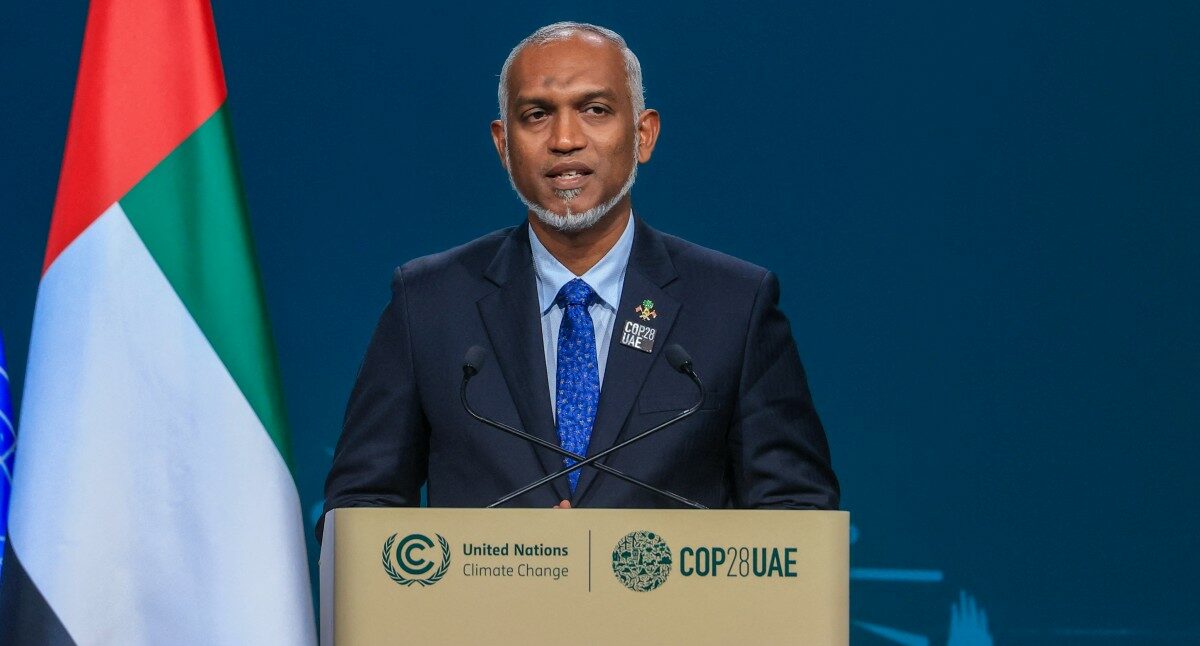Male, Maldives – Returning from his state visit to China in January, President Mohamed Muizzu made an important announcement: He said state health insurance provider Aasandha’s coverage will be expanded to the United Arab Emirates and Thailand to allow Maldivian citizens more avenues for seeking better healthcare.
In any other country it may seem like a minor measure, but not in the Maldives, which has heavily relied on India to provide medical treatment to its citizens not available locally.
According to one Maldivian media report, Indian hospitals have been the biggest foreign beneficiary of Aasandha’s coverage with the amount being disbursed to them in the past 10 years totaling MVR 1.4 billion (US$ 90.9 million).
The Maldives is made up of about 1,200 islands and atolls spread over an area of 90,000 sq km. But the land area is only about 300 sq km and the number of inhabited islands is 200.
Providing healthcare to 520,000 citizens has two main challenges — the limited availability of advanced treatments and transporting patients to hospital in case of emergencies.
While its focus remains on setting up high-quality tertiary care hospitals, the Maldives in the meantime wants to send its patients to safe and affordable destinations with good hospitals. The UAE and Thailand are two such options.
It will start operating air ambulance services to Colombo from March this year to handle health emergencies.

Muizzu, who won last year’s presidential election on the “India Out” platform against Ibrahim Mohamed Solih’s “India first” policy, sees the healthcare sector as strategic to his economic and political vision.
The “India Out” election campaign was focused on the removal of Indian military personnel operating two helicopters and one maritime patrol aircraft.
Since becoming president on November 17, he has reaffirmed friendly relations with India but maintained has an uncompromising position on the presence of Indian troops.
“Discussions with this foreign nation are underway through diplomatic channels. We have requested to withdraw the foreign military personnel in the Maldives. These discussions are still ongoing. As agreed in the latest negotiations, the military personnel in 1 of the 3 aviation platforms will be withdrawn before 10 March 2024. And the military personnel on the remaining 2 platforms will be withdrawn before 10 May 2024,” Muizzu said in his address to the People’s Majlis (parliament) on February 5.
In December, the Maldives decided not to renew an agreement with India on conducting hydrographic surveys in Maldivian waters. The memorandum of understanding on hydrography was among a number of documents signed between India and the Maldives during Prime Minister Narendra Modi’s June 2019 visit to Male.
As agreed, if one party wishes to end the pact, the other party must be informed of the decision six months before the agreement is set to expire. Therefore, the deal will expire in June this year.
“We have officially communicated that the Maldivian government will not renew the agreement which gives a foreign nation the power to measure and map the Maldivian oceans and coastlines. We will not give in to any pressure that can quiver the sovereign state of the country,” Muizzu said in the Majlis speech, without mentioning India by name even once.
These developments are a clear sign that the level of engagement with India is likely to come down as Muizzu not only does not follow an “India first” policy but is proactively seeking deeper engagements with key foreign partners.
Western media labels him “pro-China,” an easy tag because India-China strategic rivalry is frequently talked about.
However, Muizzu rejects such characterization and asserts that he is just “pro-Maldives.”
China as a potential source of investment and knowhow does occupy a significant place in Muizzu’s foreign policy and economic collaboration.
Greater engagement is also expected with the Gulf states, Turkiye and key European and Asian countries.
It becomes clear from the new president’s actions and pronouncements that he has definite ideas about widening his circle of friends and partners.
“Protecting our sovereignty and promoting unity through bilateral and multilateral engagement is a crucial aspect of our foreign policy,” Muizzu said.
He believes in developing close relations with “any country that respects the sovereignty and independence” of the Maldives and offers cooperation and assistance.
“We will further strengthen our relations with our neighbouring countries, and with our trade and development partners, especially Islamic countries,” Muizzu said.
The Majlis speech provides a solid indication of the new administration’s domestic and external priorities. Protecting Islamic identity, investing in education, sports, public services and infrastructure are among major national priorities.
The plans for growing seafood exports, capacity building in defense, building transport and logistics facilities, and creating an industrial free zone and an international financial services centre create opportunities for collaboration with different countries.
The Maldives has a strong fisheries sector and Muizzu and Foreign Minister Moosa Zameer have been busy discussing prospects of raising exports to Turkiye, the European Union and China.
For increasing maritime surveillance, it has been reported that the Maldives may purchase drones for sea patrols from Turkiye, but an official announcement is yet to be made.
The Maldives is in need of patrol aircraft and boats.
“I believe that the modern military capability to defend the country by road, sea and air should be strengthened,” Muizzu said.
“The Maldivian Defence Force will soon be able to conduct the surveillance of the 900,000 square kilometre Exclusive Economic Zone of the Maldives, 24 hours a day,” he pledged in the Majlis speech.
With a growing population and the country’s popularity as a beach tourist destination, the Maldives is keen to develop an efficient health sector.
This is part of the new economic agenda that aims to double the country’s gross domestic product (GDP) to US$12 billion by 2028.
The new administration is stepping up work on various projects.
Velana International Airport, the main international transport hub, has nearly tripled its cargo handling capacity with the opening of a new terminal in January.
A major transformation project aims to raise the airport’s passenger handling capacity to 25 million per year within two decades. In the initial phase, a new passenger terminal building will have the capacity to handle up to 7.5 million passengers a year.
Twenty new resorts offering more than 2,800 beds will open this year while the tourism industry is being prepared to attract major international conferences and events.
While the hospitality sector is already top-notch, hospitals are being modernized and specialist facilities added to reduce the need of seeking treatments abroad.







